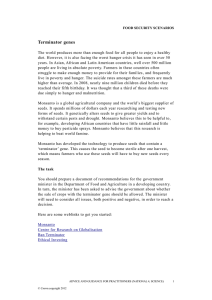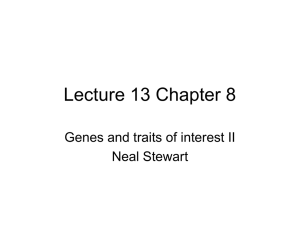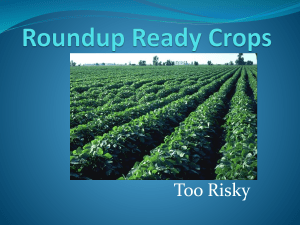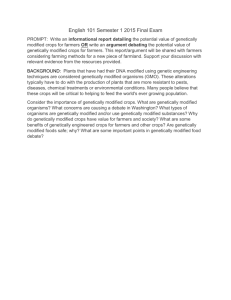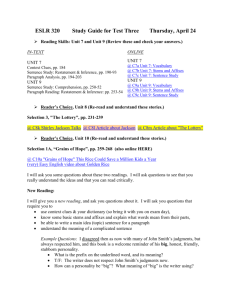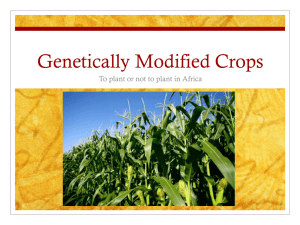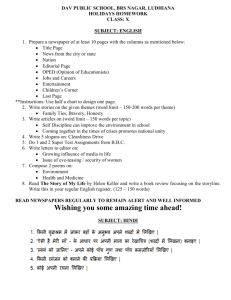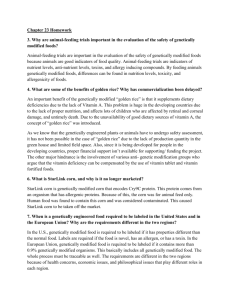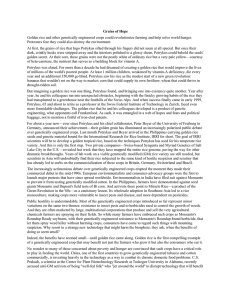Dr Martin Hodson's slideshow Powerpoint
advertisement
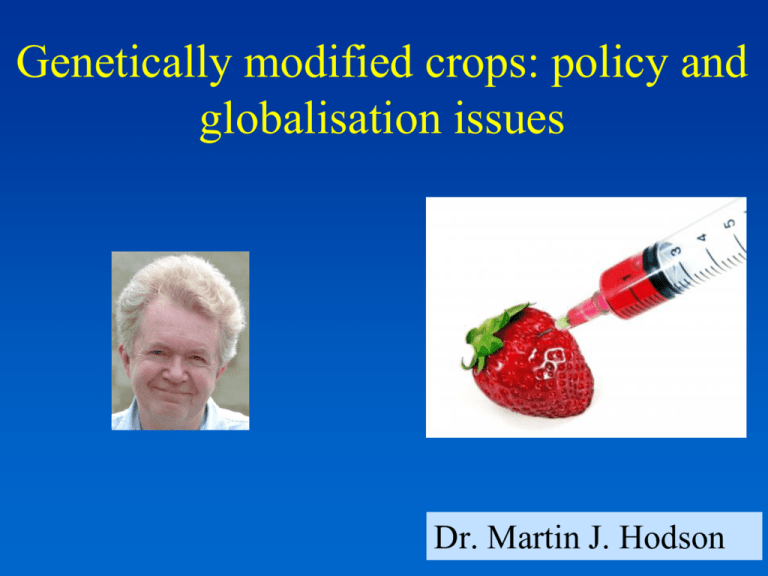
Genetically modified crops: policy and globalisation issues Dr. Martin J. Hodson The Questions • • • • • • • • • • How? Why? What? Environment? Food? Ethics? Theology? Business? Politics? Globalisation? The Globalisation Problem • The issues we face here are not necessarily related to whether GM Crops are a “good thing” or not. • Like most technologies it is how they are used, and who they are used by that are the biggest problems. • The globalisation problems are really just a symptom of a wider problem in agriculture and society. Where? Where? Millions hectares 90 80 70 60 50 40 Millions hectares 30 20 10 0 North America Latin America Africa Europe Asia & Australia Where? 1 2 3 North America 1980 1980 to 1996 • 1983 genetically modified tobacco resistant to an antibiotic • 1985 first GM crop trials • 1993 US Food and Drug Administration allows companies to market GM seed • 1994 Flavr Savr tomato, is approved in the US • 1996 Herbicide-tolerant GM soya bean available in US Who produces GM Crops? • 2008- Monsanto produced more than 90% of GM crops worldwide. Syngenta, Bayer CropScience, Dow and BASF make the rest. • But patents begin to expire in 2014. • Rise of GM crop research and production in China, India etc. 2012 GM Percentages of the top 3 crops grown in the USA: Maize (Corn) 88% Cotton 94% Soybean 93% Source: USDA The Opponents- N. America Opposition takes the form of: 1) Battles over patent law. 2) Worries over food safety. 3) Battles over food labelling. Percy Schmeiser (1997 onwards) “Now, at 70, I am involved with this fight with Monsanto. I stood up to them because a farmer should never give up the right to use his own seed. I felt very strongly about it because my grandparents came here from Europe in late 1890s and early 1900s to open this land, to be free, and to grow what they wanted to grow. Now we are going back to a feudal system that they left because they were not free—basically we are becoming serfs of the land.” Percy Schmeiser (image: Wikimedia Commons) Roundup ready canola (oilseed rape). 19 Feb 2013. Bowman vs Monsanto US Supreme Court 2010- USA In a Deloitte 2010 Food Survey more than a third of US consumers were very or extremely concerned about eating genetically modified foods, down 3 percent from 2008. California Proposition 37 (2012) Genetically Engineered Food LabellingElection Results Yes or No Votes Percentage Yes 6,088,714 48.59% No 6,442,371 51.41% TOTAL 12,531,085 100% 22 Feb. 2013 • New Jersey • A coalition presses the state to become the first in the United States to label genetically engineered food UK & Europe Early history in UK • 1994 The first GM food, the Flavr Savr tomato (Calgene), is approved in the US • 1996 GM tomato paste arrives in Britain. • Sold well at first, but withdrawn by 1999. • 2003 GM Nation Debate • “Frankenfoods” Frankenfoods Why so little GM in UK? Great Plains The Cotswolds Worries Associated with Food Horse meat Bovine spongiform encephalopathy (BSE) "Mad Cow Disease" Foot and Mouth Oxford Farming Conference: 3 Jan. 2013 Owen Paterson (UK Environment Secretary) Image: Wikimedia Commons “We should not be afraid of making the case to the public about the potential benefits of GM beyond the food chain - for example, reducing the use of pesticides and inputs such as diesel. I believe that GM offers great opportunities but I also recognise that we owe a duty to the public to reassure them that it is a safe and beneficial innovation.” Oxford Farming Conference : 3 Jan. 2013 "I want to start with some apologies. For the record, here and upfront, I apologise for having spent several years ripping up GM crops. I am also sorry that I helped to start the antiGM movement back in the mid 1990s, and that I thereby assisted in demonising an important technological option which can be used to benefit the environment." Mark Lynas "My conclusion is very clear: the GM debate is over. It is finished. We no longer need to discuss whether or not it is safe – over a decade and a half with three trillion GM meals eaten there has never been a single substantiated case of harm. You are more likely to get hit by an asteroid than to get hurt by GM food." Are you convinced that GM food is both safe and beneficial? Yes 28% No 72% Guardian Poll 3 Jan. 2013 Science 22 Feb. 2013 The GMO Stalemate in Europe Louise O. Fresco, Editorial: “The European Union (EU) differs from most of the world in its strong opposition to the use of genetic modification in agriculture.” “Europe’s lack of trust in GMOs reflects a wider distrust of science.” “….. efforts to ease acceptance of genetic modification have failed.” Developing World Golden Rice Image: International Rice Research Institute (IRRI) Golden rice produces beta-carotene, a precursor of vitamin A, in the grain. The idea is to produce a fortified food to be grown and consumed in areas with a shortage of dietary vitamin A. Published in Science (2000) an eight-year project by Ingo Potrykus & Peter Beyer First field trials 2004 Potrykus- golden rice to be distributed for free to subsistence farmers. A US$10,000 cut off between humanitarian and commercial use was set. So if a farmer of golden rice makes less than $10,000 per year, no royalties need to be paid. In addition, farmers are permitted to keep and replant seed. Golden Rice- latest “In short, Golden Rice will only be made available broadly to farmers and consumers in the Philippines if it is approved by national regulators and shown to reduce vitamin A deficiency in community conditions. This process may take another two years or more.” (IRRI, 21st Feb. 2013) Terminator Genes • Restricts the use of GM plants by causing second generation seeds to be sterile. • Would prevent gene movement. • Never commercialised. • But if companies lost patent battles…… It is hard to trust GM when it is in the grip of a few global giants “I fear much of the problem of trust stems from the chemical company Monsanto, which from the start has been the world's largest producer, researcher and distributor of the crops. Its fierce use of patents, its heavy-handed lobbying of governments to deregulate markets, and its buying up of seed companies internationally have scared the public, raised concerns among small farmers the world over and denied the public the potential benefits.” John Vidal (The Observer) Sunday 3 February 2013 Alternatives?? “Genetically modified plants and GM fish may have a sustainable contribution to make in some environments just as ecological agriculture might be a superior approach to achieving a higher sustainable level of agricultural productivity.” International assessment of agricultural knowledge, science and technology for development (IAASTD, 2008) SRI India’s Rice Revolution “In a village in India’s poorest state, Bihar, farmers are growing world record amounts of rice- with no GM and no herbicide. Is this one solution to world food shortages?” John Vidal (The Observer) Saturday 16 February 2013 Globalisation Conclusion • Huge differences between Europe and N. America • Key battles are over patents and food labelling. • At the moment much is controlled by one large company. • Even if the technology is proven to be “safe” worries over multinational control are real and need to be addressed.
